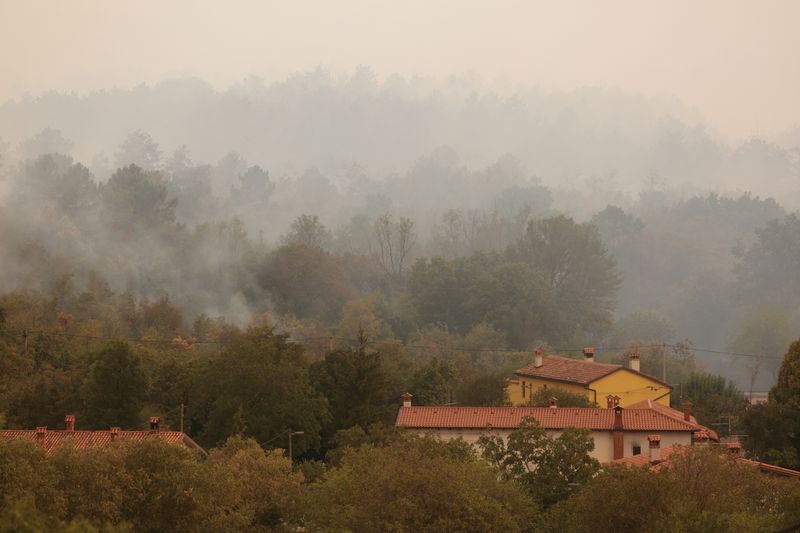By Nancy Lapid
(Reuters) - Wildfires are increasing in frequency and intensity in many countries, spreading smoke that contains noxious gases, chemicals and particulate matter and carries serious health risks. More toxic than air pollution, wildfire smoke can linger in the air for weeks and travel hundreds of miles.
Wildfires "are burning not only vegetative materials and trees but also cities, completely destroying vehicles and buildings and their contents," said Kent Pinkerton, Director of the Center for Health and the Environment at the University of California, Davis.
Along with particles of soil and biological materials, wildfire smoke often contains traces of metals, plastics and other synthetic materials.
WHAT ARE THE KNOWN HEALTH EFFECTS?
Laboratory experiments have shown that a given amount of wildfire smoke causes more inflammation and tissue damage than the same amount of air pollution, Pinkerton said.
Studies in people have linked wildfire smoke with higher rates of heart attacks, strokes, and cardiac arrests; increases in emergency room visits for asthma and other respiratory conditions; and weakened immune defenses.
Some increased transmission of COVID-19 has been attributed to the spread of virus on particulate matter in wildfire smoke. Wildfire exposure in pregnancy has been associated with pregnancy loss, low birth weight, and preterm delivery. Wildfires have also been linked with eye irritation and itchy skin, rashes and other dermatological problems.
Studies in firefighters have documented higher risks for cancer in these heavily-exposed workers, but less is known about cancer risks to the public.
Canadian researchers reported in May in The Lancet Planetary Health https://www.thelancet.com/journals/lanplh/article/PIIS2542-5196(22)00067-5/fulltext that people who lived outside of major cities and within 50 kilometers (31 miles) of a wildfire in the past decade had a 4.9% higher risk of lung cancer and a 10% higher risk of brain tumors compared to people not exposed to wildfire.
At UC Davis, researchers are tracking cancer rates in people exposed to the 2018 Camp Fire, the most destructive wildfire in California's history.
WHAT IS UNKNOWN?
More frequent wildfires mean people will be exposed more often, but studies are just getting underway on the health effects of wildfire smoke exposure over multiple seasons.
"Repeated exposure, summer after summer after summer, is more likely to cause diseases, but it is hard to make predictions because it is hard to say how many fires people will be exposed to, how long the fires will burn, or what the smoke will contain," said Keith Bein of the Center for Health and Environment at UC Davis.
Other focuses of current research include the long-term effects of smoke particles in water supplies, on crops or ingested by livestock; the long-term effects of urban wildfire smoke; the effects of wildfire exposure in utero on children's neurological development and respiratory outcomes and whether wildfire smoke amplifies the adverse effects of extremely hot weather.
WHAT CAN HELP MITIGATE THE RISKS?
An online course https://www.epa.gov/wildfire-smoke-course/reducing-exposure-wildfire-smoke with instructions for reducing outdoor and indoor exposure to wildfire smoke is available from the U.S. Environmental Protection Agency.
